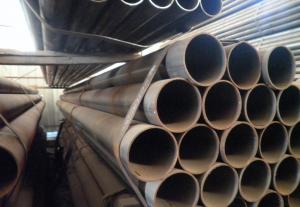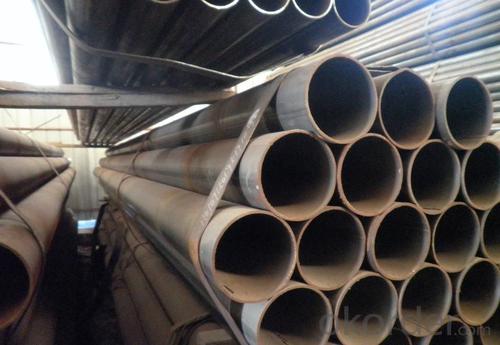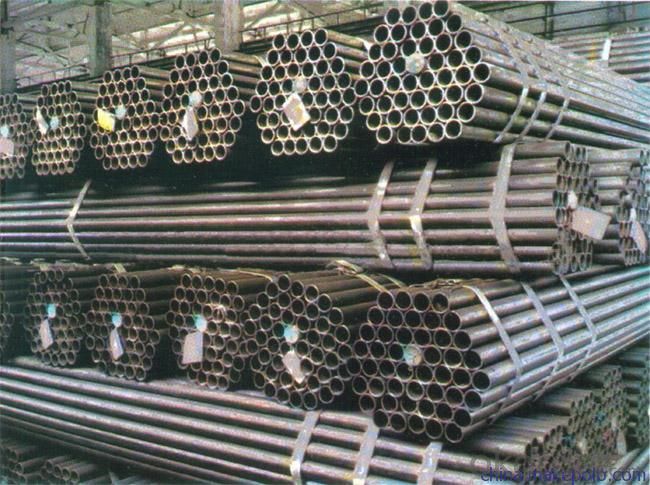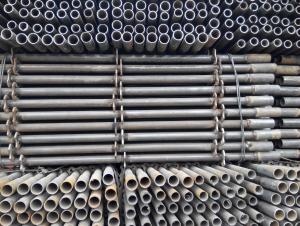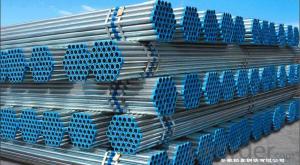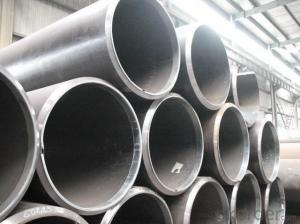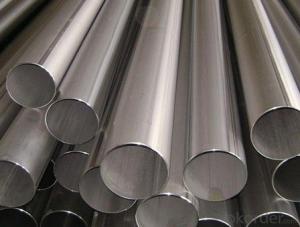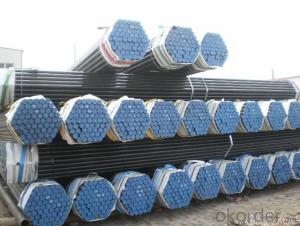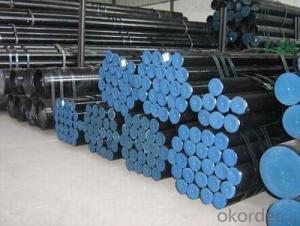Seamless Steel Pipe/Tube ASTM SPEC 5CT American Standard
- Loading Port:
- Shanghai
- Payment Terms:
- TT or LC
- Min Order Qty:
- 25 m.t.
- Supply Capability:
- 9000 m.t./month
OKorder Service Pledge
OKorder Financial Service
You Might Also Like
1、Structure of Seamless Steel Pipe/Tube ASTM SPEC 5CT American Standard:
Seamless Steel Pipe/Tube ASTM SPEC 5CT American Standard is to be used for conveying gas, water, and petroleum foroil and natural gas industries. And used for structural steel pies purpose. As the manufacturing process does not include any welding, seamless pipes are perceived to be stronger and more reliable. Historically seamless pipe was regarded as withstanding pressure better than other types, and was often more easily available than welded pipe.
2、Main Features of Seamless Steel Pipe/Tube ASTM SPEC 5CT American Standard:
• High manufacturing accuracy
• High strength
• Small inertia resistance
• Strong heat dissipation ability
• Good visual effect
• Reasonable price
3、Seamless Steel Pipe/Tube ASTM SPEC 5CT American Standard,Specification:
Standard | GB, DIN, ASTM ASTM A106-2006, ASTM SPEC 5CT-2007 |
Grade | 10#-45#, 16Mn 10#, 20#, 45#, 16Mn |
Thickness | 8 - 33 mm |
Section Shape | Round |
Outer Diameter | 133 - 219 mm |
Place of Origin | Shandong, China (Mainland) |
Secondary Or Not | Non-secondary |
Application | Hydraulic Pipe |
Technique | Cold Drawn |
Certification | API |
Surface Treatment | factory state or painted black |
Special Pipe | API Pipe |
Alloy Or Not | Non-alloy |
Length | 5-12M |
Outer Diameter | 21.3-610mm |
Grade | 20#, 45#, Q345, API J55, API K55, API L80, API N80, API P110, A53B |
Standard | ASME, ASTM |
1) Material:20#(ASTM A 106/A53 GRB.API5LGRB,GB),45#,16Mn,10#.
2) Specification range:OD:21.3-610mm,WT:6-70mm,length:6-12m or according to the requirement of clients.
3) Excutive standards:GB,ASME API5L.ASTM A 106/A53,Despite of the above standards,we can also supply seamless steel pipe with standard of DIN,JIS,and so on,and also develop new products according to the requirements of our clients!
4) Surface:black lacquered,varnish coating or galvanized.
5) Ends:Beveled or square cut,plastic capped,painted.
6) Packing:bundles wrapped with strong steel strip,seaworthy packing.
4、Packaging & Delivery
Packaging Details: | seaworthy package,bundles wrapped with strong steel strip |
Delivery Detail: | 15-30days after received 30%TT |
5、FAQ of Seamless Steel Pipe/Tube ASTM SPEC 5CT American Standard:
①How is the quality of your products?
Our products are manufactured strictly according to national and internaional standard, and we take a test
on every pipe before delivered out. If you want see our quality certifications and all kinds of testing report, please just ask us for it.
Guaranteed: If products’ quality don’t accord to discription as we give or the promise before you place order, we promise 100% refund.
②How about price?
Yes, we are factory and be able to give you lowest price below market one, and we have a policy that “ for saving time and absolutely honest business attitude, we quote as lowest as possible for any customer, and discount can be given according to quantity”,if you like bargain and factory price is not low enough as you think, just don’t waste your time.Please trust the quotation we would give you, it is professional one.
③Why should you chose us?
Chose happens because of quality, then price, We can give you both.Additionally, we can also offer professional products inquiry, products knowledge train(for agents), smooth goods delivery, exellent customer solution proposals.Our service formula: good quality+good price+good service=customer’s trust
SGS test is available, customer inspection before shipping is welcome, third party inspection is no problem.
6、 Seamless Steel Pipe/Tube ASTM SPEC 5CT American Standard: Images:
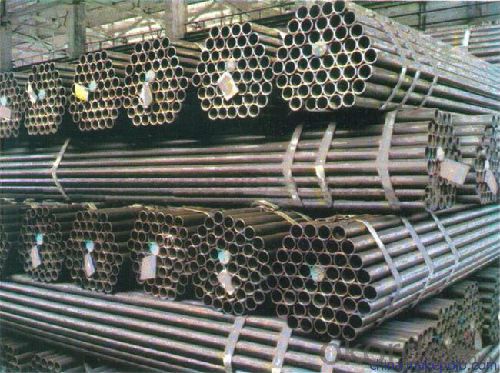
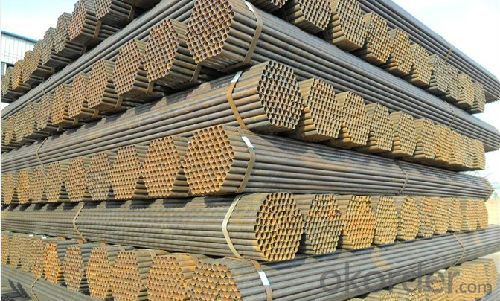
- Q: Can steel pipes be used for the construction of offshore platforms?
- Yes, steel pipes can be used for the construction of offshore platforms. Steel pipes are commonly used in offshore platforms due to their durability, strength, and resistance to corrosion. They can be utilized for various purposes such as structural support, transportation of fluids, and installation of equipment. Additionally, steel pipes are readily available, cost-effective, and can withstand the harsh marine environment, making them a suitable choice for offshore platform construction.
- Q: What is the difference between steel pipes and copper-nickel pipes?
- Steel pipes and copper-nickel pipes differ in terms of their composition and properties. While steel pipes are primarily made of steel, copper-nickel pipes are composed of a mixture of copper and nickel. This difference in composition leads to variations in their strength, corrosion resistance, and thermal conductivity. Steel pipes are generally stronger and more durable, making them suitable for high-pressure and heavy-duty applications. On the other hand, copper-nickel pipes have excellent corrosion resistance, particularly in marine environments, and exhibit good thermal conductivity, making them ideal for heat transfer applications. Ultimately, the choice between steel pipes and copper-nickel pipes depends on the specific requirements and conditions of the intended use.
- Q: What are the different coatings used on steel pipes?
- There are several different coatings used on steel pipes, including but not limited to epoxy coatings, polyethylene coatings, zinc coatings, and galvanized coatings.
- Q: Are steel pipes suitable for use in coastal areas?
- Yes, steel pipes are suitable for use in coastal areas. Steel is highly resistant to corrosion and can withstand the harsh environmental conditions typically found in coastal regions, such as saltwater spray and high humidity. Additionally, steel pipes offer excellent structural strength, making them well-suited for various applications including marine construction, offshore oil and gas platforms, and coastal infrastructure projects.
- Q: What are the advantages of using steel pipes in industrial plants?
- There are several advantages of using steel pipes in industrial plants. Firstly, steel pipes are known for their exceptional strength and durability. They can withstand high temperatures, pressure, and heavy loads, making them ideal for transporting various materials and fluids within industrial facilities. Secondly, steel pipes have excellent resistance to corrosion. This is particularly important in industrial settings where the pipes come into contact with corrosive substances or are exposed to harsh environmental conditions. The corrosion resistance of steel pipes ensures their longevity and helps to prevent leaks, which can be costly and hazardous. Additionally, steel pipes offer a high level of versatility. They can be easily fabricated and customized to meet specific requirements, such as different sizes and shapes. This flexibility allows for easier installation and maintenance, reducing downtime and improving overall efficiency in industrial plants. Moreover, steel pipes have a smooth interior surface, which offers several advantages. It allows for efficient flow of materials, minimizing resistance and pressure drop. This smoothness also makes steel pipes less prone to accumulating deposits and contaminants, ensuring a clean and hygienic environment. Furthermore, steel pipes are highly resistant to fire. In industrial plants, where fires can have catastrophic consequences, the fire resistance of steel pipes provides an added layer of safety. Lastly, steel pipes are cost-effective in the long run. Although their initial installation cost may be higher compared to other materials, such as plastic or copper, their durability and low maintenance requirements result in significant cost savings over time. Steel pipes have a long lifespan, reducing the need for frequent replacements or repairs, and their resistance to corrosion and other damages also contributes to cost reduction. In conclusion, the advantages of using steel pipes in industrial plants include their strength, durability, corrosion resistance, versatility, efficient flow, fire resistance, and cost-effectiveness. These qualities make steel pipes a reliable and efficient choice for various applications within industrial facilities.
- Q: Can steel pipes be used for underground heat exchange systems?
- Yes, steel pipes can be used for underground heat exchange systems. Steel pipes are commonly used for this purpose due to their durability and resistance to corrosion. They can effectively transport and exchange heat in underground systems, making them a suitable choice for such applications.
- Q: Seamless steel tube 89X4 meters, how heavy?
- Generally seamless steel pipe wall thickness will be uneven, according to the theory, each meter is 8.3844 kilograms, but if the wall thickness is poor 20--30 wire, then the weight will increase some
- Q: What are the different grades of steel used in pipes?
- The different grades of steel used in pipes vary based on their composition and properties. Some common grades include carbon steel (such as ASTM A106 or API 5L), stainless steel (such as ASTM A312 or ASTM A269), and alloy steel (such as ASTM A335). Each grade has specific characteristics that make it suitable for different applications, such as high temperature or corrosive environments.
- Q: Can steel pipes be used for underground water wells?
- Yes, steel pipes can be used for underground water wells. Steel pipes are commonly used for drilling water wells due to their durability, strength, and resistance to corrosion. However, it is important to ensure that the steel pipes are properly coated and protected to prevent any contamination of the underground water source.
- Q: Are steel pipes resistant to impact or external forces?
- Yes, steel pipes are generally resistant to impact or external forces due to their inherent strength and durability. They can withstand high pressure, heavy loads, and harsh environmental conditions, making them suitable for various applications, including construction, transportation, and industrial purposes.
Send your message to us
Seamless Steel Pipe/Tube ASTM SPEC 5CT American Standard
- Loading Port:
- Shanghai
- Payment Terms:
- TT or LC
- Min Order Qty:
- 25 m.t.
- Supply Capability:
- 9000 m.t./month
OKorder Service Pledge
OKorder Financial Service
Similar products
Hot products
Hot Searches
Related keywords
